
Last week, Melody Lenox filed a lawsuit in Dallas County, Texas for a court order to determine who sent her a penis-shaped gummy candies via Dicks By Mail.
At first, this sounded like an extreme reaction. If someone spent $15 to send me candy via mail with a note that says “Eat a Bag of Dicks,” I’d probably laugh, and then eat them – because gummy candies are delicious. However, learning about the larger context of the situation, Lenox’s reaction seems reasonable.
The Bigger Story
Lenox is the head of human resources at Axxess Technology Solutions, a position that requires her to be the bearer of bad news to some employees. Prior to this unsolicited dick package, she allegedly had her car keyed and was the target of fake posts on Craigslist. She asserts that these acts are related.
In this context, pursuing a harassment lawsuit against the sender of these candies (assuming the same person(s) are committing these acts), makes sense. Ongoing acts like this are unacceptable.
What I suspect is happening in this case is Lenox filed a lawsuit against John Doe and then requested a court order to get the purchase information from Dicks By Mail. (Many companies have privacy policies that state they’ll protect your information unless they are required to provide it in response to a court order.) While it’s easy to key a car or post a fake Craigslist post anonymously, sending candy by mail requires a credit card, which will eventually lead to a real person – the suspected harasser.
Unmasking the Anonymous
Anytime you do something anonymously, be prepared to be unmasked. When you act anonymously online, there’s always a digital paper trail that shows the IP address of the internet connection used, the GPS location of your smartphone, the profile information of an anonymous website or social media profile, and in this case, the credit card information used for the transaction.
There have been plenty of situations where a person lost their job or found themselves in a lawsuit when their anonymous persona was unmasked. Using the internet is not an effective way to maintain your anonymity – unless you have mad skills in this area. (And if you have to question whether you have mad skills, you don’t.)
More about Dicks By Mail

Dicks By Mail is a hilarious way to send a light-hearted sugar-filled message. The company does not endorse the use of their service to threaten or bully someone. If you receive Dicks By Mail it should only be for two reasons: “[S]omeone thinks you’re either a dick or wanted you to laugh!”
And they do caution people who come to the site with vindictive intent: If you are sending this with the intent to ruin someone’s day, then maybe it’s you who needs to eat a bag of dicks.”
In case you were wondering, yes, Dicks By Mail is a U.S.-based business, so if you want to stimulate the economy while telling your elected officials what you think of them, this may be a creative way to send a message (though, it may not be effective since they won’t know it came from a constituent).
The laws that apply to the internet are constantly evolving as the courts are encountering more internet-based problems. If you want to connect with me to keep up with my thoughts about social media law, you can contact me directly or connect with me on Twitter, Facebook, YouTube, or LinkedIn. You can also get access to more exclusive content that is available only to people on my mailing list, by subscribing here.
